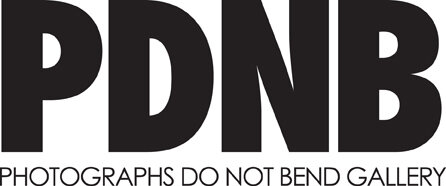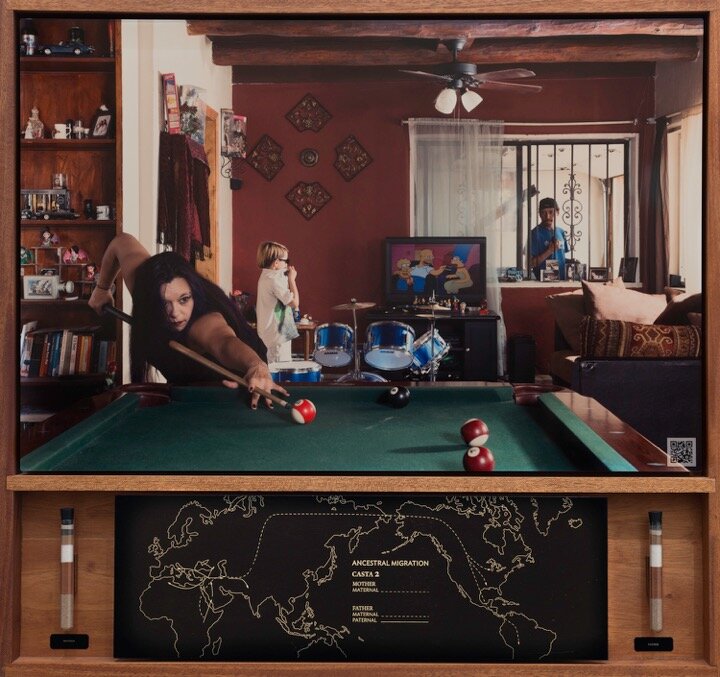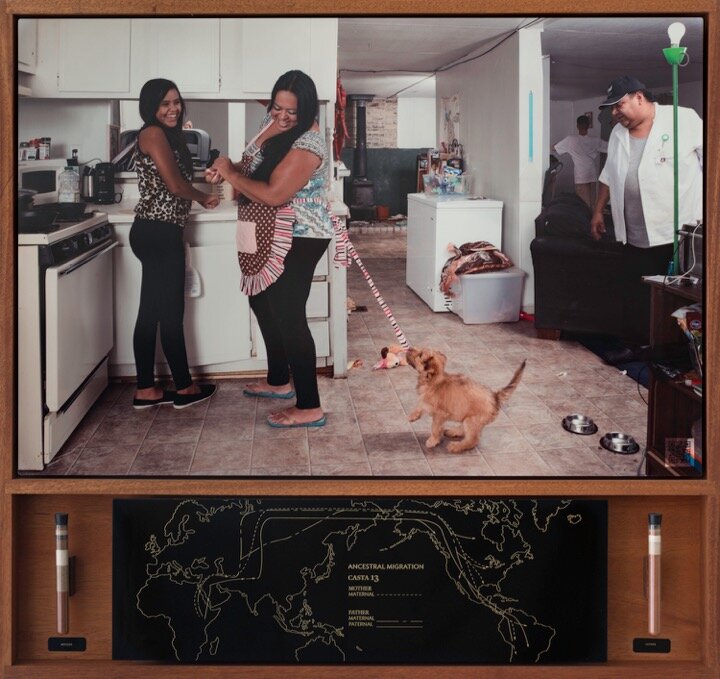DELILAH MONTOYA
Contemporary Casta Portraiture : Nuestra “Calidad”
ABOUT THE SERIES:
Contemporary Casta Portraiture: Nuestra “Calidad” is an ethnographic art project that examines the ethnic roots of Colonial Heritage Families by photographing genre portraits and DNA testing the descendants living in Houston and Albuquerque. The project builds on the paradigm that colonial families of the “New World” evolved from a global community. The nuances woven into the topic are identity, colonial power struggles, family history, the optic-unconscious, and biogeographic ethnography and how these experiences are expressed in our contemporary lives and culture.
Following the 1825-Mexican Revolution, Mexico adopted a persona centered on mixed-race/ mestizo-identity. Mexican leaders hoped to unify the populace and foster national pride, the impact of this movement still resonates, as Mexicans and Central Americans identify as mestizo. By contrast, only 6.9% of Americans identified as multiracial. This is indicative of a widely held black- and-white perspective in the United States. It is this site of contestation, myth, and erased history where I locate the series Contemporary Casta Portraiture: Nuestra "Calidad."
The photographic portraits and accompanying DNA analysis provide insights for both sitter and viewer on the instability of identity and the means through which we are inclined to construct our own histories. The project, Contemporary Casta Portraiture: Nuestra “Calidad,” has four components. That is an art exhibition with an online web component, family monologs, a catalog publication and 16 curio box like assemblages. The exhibition requires 80 to 90 running feet of wall space.
Nuestra "Calidad" is born out of research and interest in the racial categorizing as expressed in the Colonial Casta Painting that originated in New Spain. This 18th century tradition was first developed as paintings of medieval race hierarchy depicting family racial and class types and ultimately developed into endless racial permutation that took place in the colonies. Like the Colonial Casta paintings, the Nuestra “Calidad” photographs adhere to a common structure: a family is asked to sit for a portrait in the setting of their choice, I edit the shots, and then accompany it with racial identifying information. However, unlike the descriptive titles and labels used in colonial casta, I introduce racial heritage by juxtaposing the photos with DNA genetic analysis.
Sixteen family Casta portraits have been photographed and their DNA tests processed. The prints are imaged as dye sublimations on metal. Each metal portrait is inserted into a 38 x 36 inch wooden curio box placed above a laser-etched panel illustrating a world map of each family’s migration out of East Africa. Flanking the map are test tubes filled with multi-colored sand so to visualize each Casta family’s biogeographic heritage. A web page is accessed with a smart phone QR code application reader or phone camera that can scan a QR label embedded on the surface of the exhibition portraits. The web page contains the Casta family’s DNA results and opens with a monolog of a family member speaking about their family portrait and their test results.
The exhibition "Contemporary Casta Portraiture: Nuestra 'Calidad,'" features a companion catalog published by Arte Publico Press that includes the portraits and an essay by Delilah Montoya, Professor of Photography and Digital Media, School of the Art, University of Houston, "An
Artistic Biography," by Holly Barnet-Sanchez, Associate Professor Emerita Modern Latin American, Chicano/a, and Latino/a Art History Department of Art and Art History, University of New Mexico, The “(E)Quality of Nuestra ‘Calidad’” by Surpik Angelini Transart Director and "Restaging Casta and Demystifying Genetics in Delilah Montoya's Nuestra 'Calidad'” by Mia Lopez Assistant Curator at DePaul Art Museum, DePaul University, Chicago.

















